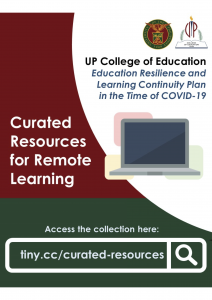 (JUN. 15)—Resources for remote learning are now available to assist educators shifting from traditional classroom instruction to blended learning when the new schoolyear opens on Aug. 24.
(JUN. 15)—Resources for remote learning are now available to assist educators shifting from traditional classroom instruction to blended learning when the new schoolyear opens on Aug. 24.
Curated by the UP College of Education, these online resources comprise materials from: leading institutions of higher learning such as the University of Denver, University of Zurich, Ryerson University, and University of Limpopo, among others; international institutions such as Unicef, Smithsonian, World Bank and UNESCO; and local resources produced by C&E Publishing Inc., the Department of Education, UP Diliman College of Social Sciences and Philosophy, Unilab Foundation (Covid Comics), UP Los Baños Department of Human and Family Development Studies and materials produced by the College itself.
These resources are available at tiny.cc/curated-resources.
Five webinars sessions will be conducted by members of the faculty. The first session, to be conducted by Prof. Francis Grace Duka-Pante at 10 a.m. on Jun. 16, is Prioritizing Self-care for the New Normal. The second is a 2-part session on Providing Psychosocial Support, by professors Abigail Thea O. Canuto and Lorelei R. Vinluan on Jun. 19, at 10 a.m.
Schedules of the remaining webinar will be announced later.
Some of the topics are: When School is Online, How Much Screen Time is too Much (Center for Media and Health); Guidance for Social Distancing in Youth and Student Programs (Minnesota Department of Health); Technology Integration in Education in Developing Countries: Guidelines to Policy Makers (Mauritius Institute of Education); Exams and Assessment in COVID-19 Crisis: Fairness at the Center (UNESCO); and Introducing Flexible Learning (Deakin University).
The resources are based on the eight key strategies presented by the College in the paper Education Resilience and Learning Continuity. These strategies are:1) Prioritize teacher and student safety, health and well-being; 2) Recalibrate curricular and assessment priorities; 3) Enact flexible learning options; 4) Empower families for home-based learning; 5) Lead for resilience and innovation; 6) Redesign the learning environment; 7) Evaluate education financing; and 8) Create new knowledge.
